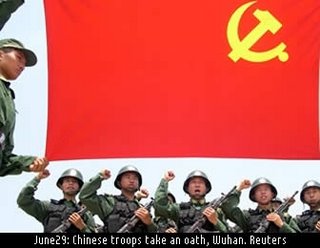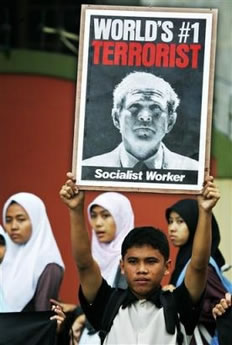Russia, China, Muslim Alliance
An Indonesian student at the Syarif Hidayatullah Islamic University holds an anti-U.S. President George W. Bush sign during a small demonstration in support of Iranian President Mahmoud Ahmadinejad who visited the University Thursday, May 11, 2006 in Jakarta, Indonesia. Ahmadinejad intensified his attacks against Israel on Thursday, calling it ‘a tyrannical regime that one day will be destroyed,’ but also said he was ready to negotiate with the United States and its allies over his country’s nuclear program.


Rumsfeld says Russia, China policies worrying
Defense Secretary Donald Rumsfeld adjusts his glasses during a news briefing at the Pentagon, May...Full Image
PARIS (Reuters) - The United States is concerned about Russia's use of its energy resources as a political weapon and China's lack of transparency over military spending, Defense Secretary Donald Rumsfeld was quoted as saying.
In an opinion piece printed in France's Le Figaro daily on Thursday, Rumsfeld said the U.S. focus was currently on Iraq and Afghanistan but that in the future, its policies would be determined by choices made by other powers such as China and Russia.
"Russia, a country with vast natural resources ... is a partner of the United States on security," Rumsfeld said.
"But on certain issues, Russia has not been very cooperative and has used its energy resources as a political weapon."
Vice President Dick Cheney provoked an angry reaction from Russia earlier this month when he told Baltic and Black Sea leaders that Russian President Vladimir Putin was backsliding on democracy and using energy reserves to "blackmail" Moscow's neighbors.
Russia drew international criticism earlier this year when it briefly turned off its natural gas taps to Ukraine in a pricing dispute that disrupted supplies to Europe.
Rumsfeld said China's lack of transparency over military spending complicated the relationship between the two countries.
"Some aspects of the Chinese attitude are worrying and complicate our relations," he said.
"A notorious lack of transparency (on military spending) is of course worrying for China's neighbors."
China says it has been open about its military spending and says that as a share of gross domestic product and the government budget it is fairly low by international standards.
-------------------
With his talk of genocide and destroying Israel, Mahmoud Ahmadinejad has captivated the hearts of students in the “moderate” Islamic state of Indonesia, at two of the country’s most prestigious universities
Iran's leader a new hero among Indonesians
May 11, 2006
Stephen Fitzpatrick , The Australian
HE'S tiny, wears a perfectly groomed beard and waves to his supporters with both hands clasped high in the air, prize-fighter-style - and now Jakarta's university students have declared Mahmoud Ahmadinejad "the world's most charismatic leader".While much of the world struggles to come to terms with Iran's plans for developing nuclear technology, its enigmatic President spent yesterday playing to his new fans at two of Indonesia's most prestigious academic institutions.
Ahmadinejad is having a hard time finding friends on the international stage after refusing to back down on his declaration that Iran has a right to enrich uranium. He insists the country's nuclear program is a peaceful one, and that all nations - not just the already nuclear-armed ones - have a right to develop the technology. His 18 pages of musings on the parlous state of a conflict-ridden world, delivered to US counterpart George W. Bush this week, found little sympathy on their delivery to Washington.
And an "EU3" committee of France, Britain and Germany trying to work out ways to get Iran to abandon its nuclear intentions faces an uphill battle. But the leader of one of the world's least-understood regimes was enthusiastically welcomed yesterday by throngs of students and academics at the two universities in Jakarta most likely to influence the thinking of Indonesia's ruling class. Ahmadinejad is visiting the world's most populous Muslim nation at the behest of Indonesian President Susilo Bambang Yudhoyono, himself only just back from a whirlwind tour of the Middle East.
Yudhoyono on Wednesday proposed a new forum to examine Tehran's nuclear ambitions, along the lines of the six-party talks designed to find a solution to the North Korean nuclear threat. The excitement was clear at the University of Indonesia and the nearby State Islamic University, with students on both campuses voicing their admiration for a leader facing off against the "oppression" and "colonialism" of the US. Banners and T-shirts in support of Iraq and nuclear power research, and denouncing Israel, were strategically placed. "He's incredibly charismatic - if you had to compare him to someone, it would be (Indonesia's founding president) Sukarno," said one student.
"His speeches are very nationalistic." "There's not a leader in the world like him," declared another. "I am so proud." Ahmadinejad's addresses to the two audiences - which included a repeat of recent rants against Israel - were full of the nationalist rhetoric that has characterised his appearances since winning office almost a year ago.
Nuclear technology is the most sophisticated field of research known to science and every nation has a right to pursue its own place in the field, independent of domination by countries such as the US, goes the line. And if Indonesia wants to turn to Iran for help in the field, Ahmadinejad is willing to help.
At least one student at the University of Indonesia found out just how willing: her questions in fluent Farsi impressed Ahmadinejad so much that he awarded her an on-the-spot scholarship, in front of the crowd, to study nuclear technology in Iran.



<< Home